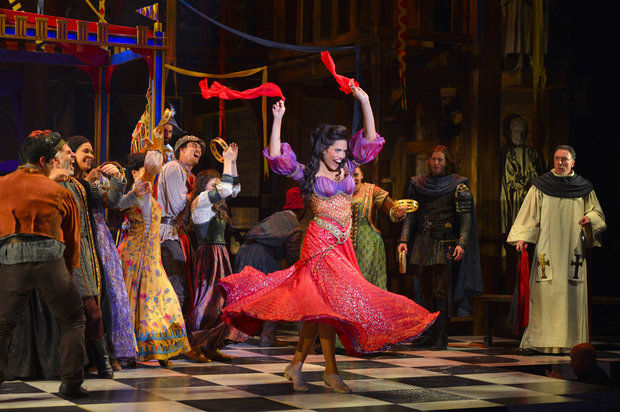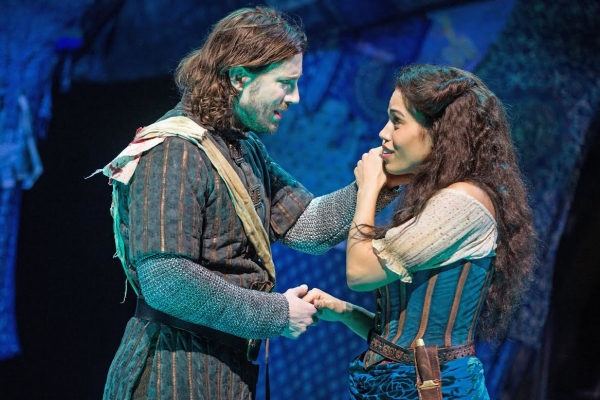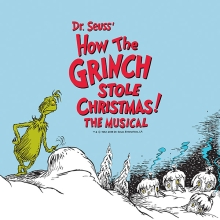Filichia Features: Notre Dame Comes To New Jersey
Filichia Features: Notre Dame Comes To New Jersey
![]() Victor Hugo is very much in place, but Victor, Hugo and Laverne are gone.
Victor Hugo is very much in place, but Victor, Hugo and Laverne are gone.
We’re talking about one of the fundamental changes between the 1996 animated The Hunchback of Notre Dame and the new stage version that officially debuted at the Paper Mill Playhouse on March 15.
If you saw the hit film, you may recall that title character Quasimodo, had three imaginary friends – gargoyles, no less -- with whom he conversed and confided. At least one of the 24 (!) screenwriters named two Victor and Hugo in honor of the man who wrote the 1831 novel The Hunchback of Notre Dame. As for Laverne, how nice to know that someone still remembers The Andrews Sisters.
The trio was there purely for comic relief, as well as to introduce a jaunty song by composer Alan Menken and lyricist Stephen Schwartz: “A Guy Like You.” Here the gargoyles convinced Quasimodo that despite his physical appearance, Esmerelda, the gypsy girl he loved, might come to love him, too.
Well, she didn’t, neither in the animated film nor in the novel. The latter, rather than the 1996 screenplay, is what librettist Peter Parnell has more faithfully adapted. The result is a musical that doesn’t skirt from the heavy issues of prejudice, hypocrisy, abuse of power, religious fundamentalism and – need we add? -- lust.
As a result, Schwartz stresses, “It’s important for people to know that this is not the Disney animated feature. Obviously we hope that it will be entertaining, moving and exciting, but we’re actually stating in advance that it’s not recommended for kids under 12. People should know that if they want to bring their children, they’ll be seeing a musical of a work by Victor Hugo,” he says, punching up the author’s name lest there be any doubt of what he means. “If they come thinking they’ll see the Disney show, they should think again. We don’t want anyone to come with false expectations.”
So this version reinstates Claude Frollo as an archdeacon instead of the judge he was in the film. More significantly, Parnell re-inserts Frollo’s brother Jehan as father to Quasimodo, whom he conceived with a gypsy girl. And if there’s one thing that Frollo hates (actually, there are quite a few), it’s anyone who’s a gypsy.
Here, as in the novel, Frollo believes that Quasimodo was horribly disfigured because God wanted to make a statement about sex without marriage and the mingling of races. He sees his nephew as the residue of sin and demands that he never, ever leave the cathedral.
Although this version of Hunchback isn’t earmarked for kiddies, what young son or daughter won’t relate to Quasimodo’s essentially being grounded?
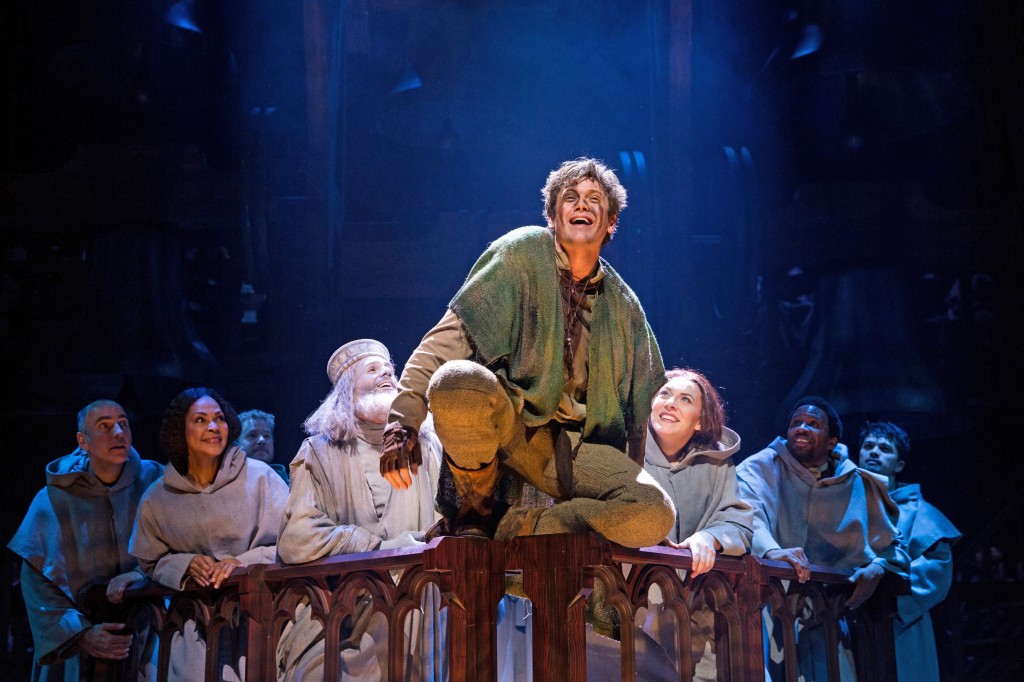
That leads to Quasimodo’s song of wanting -- to be "Out There.” The poor soul says he’d even settle for “one day.” And that “out there” isn’t a place like East St. Louis, Illinois, but the glorious Paris, everyone’s favorite international city. That makes the confinement that much more torturous.
One needn’t be a child to relate to the other aspect of Quasimodo’s plight. Frollo warns him that his misshapen appearance will mean at least scorn and most likely hatred from those in the outside world. And which of us hasn’t felt the feeling of not belonging? Haven’t we all encountered a person who can make us feel small, as Quasimodo does with Frollo?
While Frollo will never be confused with Fiorello, Parnell’s decision to have him devoted to his brother makes the man more human instead of a one-dimensional villain. Says Schwartz, putting up a wait-a-second finger, “‘Villain’ is not a nuanced enough word,” to which Menken immediately adds ““I’d use ‘antagonist.’ We want to get into the soul of Frollo as much as the soul of Quasimodo."
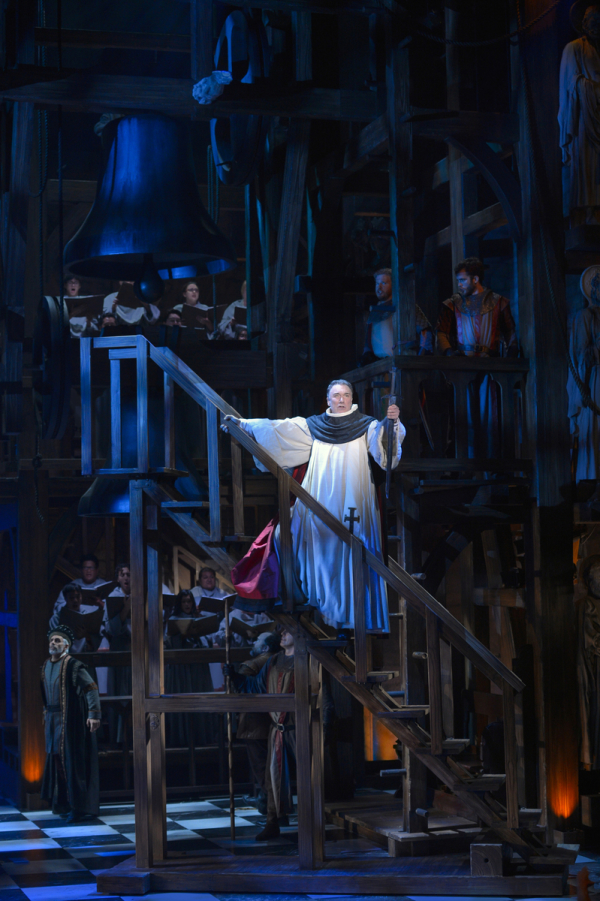 “Frollo is my favorite character I’ve ever written,” says Schwartz who – don’t forget – has composed music and lyrics for Pippin, Elphaba and Jesus Christ. So what we now have is a man whose faith comes first and before any blood relative.
“Frollo is my favorite character I’ve ever written,” says Schwartz who – don’t forget – has composed music and lyrics for Pippin, Elphaba and Jesus Christ. So what we now have is a man whose faith comes first and before any blood relative.
Of course, having a cartoon Quasimodo isn’t as off-putting as seeing a genuine actor whose face is distorted and who doesn’t have the benefit of even a Phantom of the Opera mask. “Scott had a great idea on how to handle that,” says Schwartz.
“Scott” is Scott Schwartz. He and Stephen don’t just happen to have the last name; Scott is Stephen’s son.
Have you a smirk on your face prior to crying out “Nepotism!” with the voice and passion that Quasimodo gives to “Sanctuary!”?
Well, then, explain how the younger Schwartz has directed two Broadway shows (Jane Eyre and Golda’s Balcony) and two of the most popular cult musicals of the twenty-first century: Bat Boy and TICK, TICK … BOOM! – which have nothing to do with his famous parent.
Schwartz père is secure when he says, “Scott had a clear concept on how Quasimodo should be presented. He expressed it to Disney and they liked it. Then Disney called me and said ‘How would you feel if your son directed the stage version of Hunchback?’”
So in a semi-manner of speaking, the son got his father the job – for there might not be a stage Hunchback if Disney hadn’t liked Schwartz fils’ concept.
However, there is that venerable proverb “A boy does not become a man until he can beat up his father.” Have the Schwartzes been getting along – or have matters been, as one song title goes, “Topsy Turvy?”
“I’ll say this,” Schwartz states. “Scott came up with an idea that I wasn’t all that sure about -- until I saw it on stage and realized that he was right.” In other words, to paraphrase an Oscar Hammerstein lyric, “By your offspring you’ll be taught.” Remember, too, that Schwartz wrote a song for his excellent musical Working called “Father and Sons,” in which he wrote about the feelings of loss a daddy has when his kid sees that “Fathers make mistakes” and that he isn’t any longer “your hero.” The flip side of that coin is the pride a father feels when his son succeeds.
More pride was to be had. “There’s a passage in the novel that – of course – Scott found,” says Schwartz. “Hugo wrote that the figures of stone in the cathedral -- the saints, the monsters and even the bells spoke to Quasimodo. So we’re using those rather than three cute gargoyles to provide narration, all of which is taken from Hugo. The one big change we made – and we made it even for the film -- involves Phoebus, the soldier who falls in love with Esmerelda. In the original, he’s a jerk and a bad guy. Not here. I hate to say this, but I’m more interested in our Phoebus than the one Hugo wrote.”
There have been changes in the score, although “A Guy Like You” is the only one of the ten film songs that has been excised. Eight new songs, in part or in whole, have been added.
“One of Alan’s great strengths -- like Richard Rodgers’,” Schwartz says, “is to sound like himself and evoke a world. You cannot take one of his melodies from Aladdin or NEWSIES and put it into The Hunchback of Notre Dame. And,” he says, raising an eyebrow as if to underline the point, “I don’t think you can say that about all composers’ work.”
Menken reveals the gist of the younger Schwartz’s idea that impressed the Disney brass. “When Quasimodo is expressing what he feels inside,” he says, “we are allowed into that inner voice and see a transformation. He no longer sounds as if he has a speech impediment, but sings strongly and clearly, showing his inner beauty.”
Of course, the last Victor Hugo work to become a musical continues to have remarkable success: Les Misérables, which has lasted longer in London than even The Phantom of the Opera there or on Broadway. And the last Menken musical to debut at Paper Mill – NEWSIES – went on to play more than 1,000 Broadway performances. Is a theater somewhere between Forty-First and Fifty-Fourth Streets the next stop for Quasimodo?
“No idea,” says Menken in a case-closed voice.
“We’re not trying to be coy,” says Schwartz. “We’re first and foremost trying to do a great show for Paper Mill, which has a long and illustrious reputation. Both Alan and I have had shows here that we felt very good about. We want a great show, and it if turns out to be a great show, great things will happen to it.”
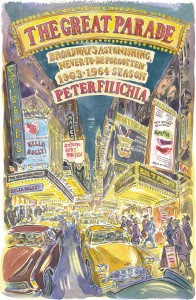 You may e-mail Peter at pfilichia@aol.com. Check out his weekly column each Tuesday at www.masterworksbroadway.com and each Friday at www.kritzerland.com. His upcoming book The Great Parade: Broadway’s Astonishing, Never-To-Be Forgotten 1963-1964 Season is now available for pre-order at www.amazon.com.
You may e-mail Peter at pfilichia@aol.com. Check out his weekly column each Tuesday at www.masterworksbroadway.com and each Friday at www.kritzerland.com. His upcoming book The Great Parade: Broadway’s Astonishing, Never-To-Be Forgotten 1963-1964 Season is now available for pre-order at www.amazon.com.
